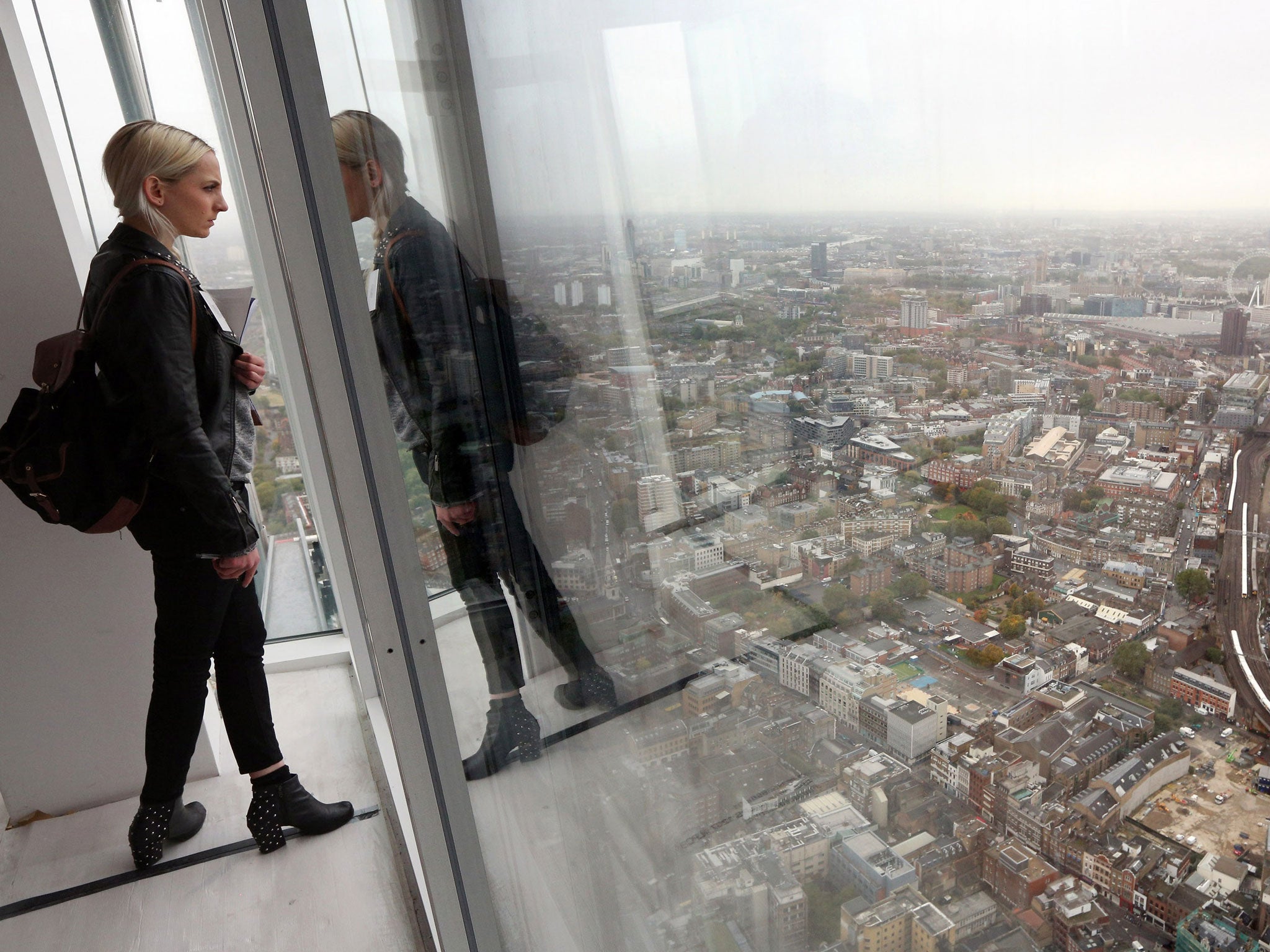The Shard's view is a new joy, but taking the high ground has always elevated the senses
Plus: A four-letter word arrives on Radio 4 and the latest spin on a misused word

Looking down from the Shard the other day, I found myself wondering about the history of looking down on things. Not metaphorically, of course – that is presumably as old as hominids – but literally, as I was doing, enjoying the 800ft gap between myself and the street below. There was a reminder that this isn't an exclusively modern pleasure some 600ft beneath me – in the form of the gilded teazle of flames that tops Sir Christopher Wren's Monument to the Great Fire of London. Boswell went up that in 1762, overcoming a panic attack to get to the top and recording shakily that it was "horrid to be so monstrous a way up in the air, so far above London and its spires." But Boswell was relishing an ancient thrill even then. In a popular 17th century guide book, Justus Zinzerling tells visitors that "a fine view of the city is beheld from the lofty tower" of St Paul's (he also warns them to keep an eye out for the gibbeted thief on the outskirts of Sittingbourne). And in 1592, Frederick Duke of Wittenberg was taken up to the highest tower of Windsor Castle, where he carved his name in the roof lead – evidence that touristic vandalism has a long and distinguished history, too. In a lot of cases, one imagines, the entrance fee placard went up just a couple of minutes after the last stone was laid.
It's hard not to think that there's some biological imperative at work in our passion for this rentable and temporary supremacy – some ancient advantage to having a panoramic view of the surrounding land which flickers within us as we take the express elevator up to the viewing platform. Elevation has always been a privilege of the powerful and the wealthy, after all. They take the top rungs of the ladder, the upper echelons of the pecking order, and the penthouse suites in the tower block. So when you visit one of these attractions, there's a sense of borrowed grandeur in the perspective you get – which is further enhanced by your grasp of a spectacle that always evades you at ground level. Roland Barthes, in a famous essay on the Eiffel Tower, suggested that it made structuralists of all its visitors (without them ever knowing it) because it gave them a tool to analyse the power relationships in the city in which they lived. But you don't have to go quite as far as he did to agree that what's usually marketed as a sensational pleasure is surreptitiously an intellectual one, too.
Up the Shard, I found myself thinking of something else as well, though. And that was the recent popularity of tilt-shift photography, that technique which takes a scene from the real world and converts it into a model village (you'll have seen it somewhere on television because it's very vogueish at the moment). The satisfaction of tilt-shift isn't entirely unconnected to the thrill we feel up a high building, where the rail networks that so frustrate us in actual use become toys, shuttling to and fro with perfect neatness. Both height and that trick of focal depth bring the world into our grasp in another sense, because they make it look cherishably manipulable. We understand the complexity of systems, can see how they interlock and sense how they might be rearranged, as in a game with scale models. So while it might still be "horrid" in Boswell's more ancient understanding of the term (as something that made the hair on the back of your neck stand up), it's also profoundly gratifying, hinting at an imagined world in which we're the biggest thing around and our thumb can blot out a building. Above about 500ft we're all children again. Did our ancestors feel that, too, before cathedrals or skyscrapers? And did being the king of the castle long predate castles?
A four-letter word arrives on Radio 4
The news that Radio 4 is to broadcast an unexpurgated reading of Tony Harrison's poem V took me back to the furore that greeted its first publication. This newspaper reprinted the whole poem so that our readers could judge for themselves, a decision which, as I recall, took the editor Andreas Whittam Smith about half a second to make. He was just as brisk when someone suggested that the swear words might be hyphenated into semi-decency. I remember how nervous I was, because I dreaded the possibility that a typo had crept into its 3,500 words. And I don't think any of us would have credited that it would one day go out on Radio 4.
The latest spin on a misused word
Back in 1917, when Guillaume Apollinaire used the word to refer to Satie's Parade, "surreal" referred to a dreamlike, irrational conjunction of real objects. These days – as demonstrated by eyewitnesses to the Vauxhall helicopter crash the other day – it means something more like, "Honest... I've never seen anything like it before." I suppose the wreckage of a helicopter on a London street does qualify as an unexpected juxtaposition. But it's hardly as unpredictable as Lautréaumont's famous instance of surrealist conjunction – "the chance encounter of a sewing machine and an umbrella on an operating table". So unless the fire-engines were covered in fur and the helicopter was shaped like an elephant, I'm just not convinced surreal is the appropriate word.
Join our commenting forum
Join thought-provoking conversations, follow other Independent readers and see their replies
Comments
Bookmark popover
Removed from bookmarks